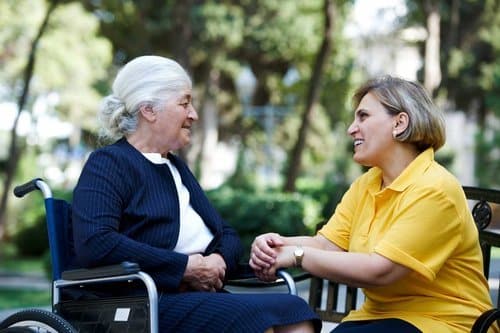Dementia is a neurodegenerative disease that leads to loss of cognitive functioning, such as thinking, remembering and reasoning. The loss of cognitive functioning eventually interferes with the affected individual’s daily life and routine. Dementia affects people of all ages, but is most common in older adults.
There are many types of dementia, and the most common include Alzheimer’s disease, vascular dementia, mixed dementia and frontotemporal dementia. Some people with dementia experience sudden changes in their behaviour.
Symptoms vary depending on which type of dementia is diagnosed. Dementia is a complex disease, each person experiences different symptoms, and their dementia is unique to them.
The severity of dementia varies from a mild stage to the most severe stage, depending on which part of the brain is affected.
Early diagnosis and treatment can help slow the progression of the disease and improve the quality of life for the affected individual. Home care assistants and home carers play an important role in providing support and care for people with dementia and their families.
If you are interested in working in this field or learning about dementia, this dementia guide for home care assistants will give you a great insight.

How to spot the signs and symptoms of dementia
The most frequent signs and symptoms of dementia happen when the neurons, or nerve cells in the brain, stop working as they normally do. They lose vital connections with other parts of the cells of the brain and die.
While it’s normal for everyone to lose neurons as they age, the loss of neurons experienced by dementia patients is far greater.
Some of the most common symptoms of dementia are:

- Memory loss, inability to judge a situation, and feeling confused
- Difficulty in speaking and expressing thoughts, including trouble finding easy words they use everyday
- Reading and writing may become difficult
- Finding it hard to recognise familiar settings such as home, street, expressing a feeling of not being where they think they should be
- Difficulty in managing money and their personal finances easily
- Constant questions – repeating those questions
- Using different or strange words to refer to familiar objects
- Finding everyday tasks takes longer than usual
- Disinterest in activities they normally enjoy or things they previously found interesting
- Signs of depression or anxiety
- Paranoia or seeing things that aren’t there Impulsive – impatient
- Lack of empathy – sympathy (easy to spot, particularly if they have been a person with these qualities before dementia)
- Not good on their feet, lack of balance / dizziness
People with development issues and disabilities or brain disorders can also develop dementia as they age. This can make it difficult to spot symptoms in these people.
With anyone concerned about memory issues, it’s important to keep track of a person’s current abilities and monitor changes over time so that an accurate diagnosis can be made. It’s crucial that the person doesn’t feel watched, as this can irritate a situation. You need to be the master of investigation, but also the master of diplomacy.
Most people with dementia hide their symptoms well, some family members may not be aware there is a problem. Living with someone with dementia makes it easier to spot the everyday changes in the simple tasks. The job of a home care assistant is to monitor a person’s possible changes, especially if there is no family member around.
What Causes Dementia?

The most common causes of dementia and other brain related issues can vary depending on the part of the brain affected. Research suggests certain changes in the brain are linked to certain forms of dementia, such as strokes or brain disorders, but in most cases the underlying conditions are unknown. Genetic mutations, which are rare problems, may cause dementia in relatively small numbers of people.
Although there is no way to prevent dementia, having a decent quality of life can help reduce the risk factors associated with this disease. Looking after yourself, mind and body will help in everyone’s case.
What are the different types of dementia?

There are numerous factors and related disorders that can contribute to the development of dementia in an individual. Neurodegenerative disorders are the result of progressive and irreversible loss of nerve cells with the brain and how it works. Unfortunately, there are no current cures for these diseases. However, research is key to understanding more about dementia to help future generations and their families.
The five most common forms of dementia are:
- Alzheimer’s disease: The most common form of dementia associated with older people. This condition is where changes in the brain occur, and abnormal proteins build up. These are known as amyloid plaques and tau tangles.
- Frontotemporal dementia: A rare form of dementia and mostly occurs in people younger than 60. According to research, it is caused by abnormal amounts or forms of proteins.
- Lewy body dementia: A form of dementia caused by abnormal deposits of a protein called alpha-synuclein, called Lewy bodies.
- Vascular dementia: Caused by a condition in which blood vessels in your brain are damaged or the flow of blood and oxygen to the brain is affected.
- Mixed Dementia: A combination of two or more types of dementia.
Other dementia-like conditions can be reversed with treatment. One such example is the normal pressure hydrocephalus, in which cerebrospinal fluid builds up in the brain. This condition can be easily resolved with treatment.
Conditions such as stress, anxiety, depression and delirium can cause serious memory problems that resemble dementia, as can side effects of certain medicines.
Other similar conditions include:
- Argyrophilic grain disease
- Creutzfeldt-Jakob disease
- Huntington’s disease
- Chronic traumatic encephalopathy
- HIV-associated dementia
Having these conditions can make it difficult to diagnose dementia, but an accurate diagnosis is important to get the best treatment. This is where as a home carer, it is your job to be extremely conscious and aware of any changes that happen within these particular people.
What other illnesses can show as dementia?
If you suspect a client may be showing the early signs of dementia, you should talk to your manager as soon as possible.
UTI – Water Infection
One thing to always check for is the chance of a Urinary Tract Infection (UTI) – a water infection. A UTI can cause chaos within someone older. If a person already has a diagnosis of dementia, you may see a UTI occur regularly. With a water infection, you will see the symptoms of the dementia progress quickly – even overnight.
A UTI can be easily treated with antibiotics. However, if left untreated, it can lead to serious complications, such as kidney damage or sepsis. If you or someone you know has been diagnosed with dementia, it is important to speak to a doctor about the possibility of UTI water infection and how it might be affecting cognitive function.
Chest Infection
Chest infections are common in people with dementia, as they may have difficulty coughing and clearing secretions from their lungs. This can lead to a build-up of fluid in the lungs, which makes it difficult to breathe and can cause pneumonia.
Chest infections are serious and can be fatal in people with dementia, so it is important to seek medical attention if you or a loved one begins to experience symptoms. Treatment for a chest infection will typically involve antibiotics and rest. In some cases, hospitalization may be necessary. With prompt treatment, most people with dementia will make a full recovery.
However, it is important to be aware that chest infections can recur and may be more serious in people with cognitive impairments. Therefore, it is important to monitor for signs and symptoms of infection and to seek medical attention as soon as possible if they develop.
It’s important that any sign of infection is tested for – if this goes undetected, it can cause a prolonged and complex situation for the patient. A UTI or chest infection can easily be treated with antibiotics.
TIA aka Mini Strokes
Recent studies have suggested a link between dementia and mini strokes, also known as transient ischemic attacks (TIA). A TIA is a brief interruption in blood flow to the brain, often caused by a clot.
Although a TIA doesn’t cause permanent damage, it can be a warning sign of an impending stroke. In a study of over 3,500 dementia patients, researchers found that those who had experienced a TIA were more than twice as likely to have dementia compared to those who had not.
The study also found that dementia patients who had TIAs were more likely to experience worsening dementia symptoms and die sooner than those who did not have TIAs.
While the link between dementia and mini strokes is still being explored, the findings of this study suggest that TIAs may be an important factor in the development and progression of dementia.
There is no cure for these conditions, but their symptoms can be managed using different treatments. Most of these treatments overlap because the symptoms of both conditions are similar.
How is Dementia diagnosed?
If there is no sign of infection and the dementia signs are increasing, a doctor will initially check and talk to the patient, and you refer to your notes about their symptoms.
They will then do a series of cognitive and neurological tests. These will help assess their thinking and physical functioning.
The GP will also check their medical history and carry out a genetics test to understand their chances of dementia. They will also carry out routine tests, such as blood pressure blood tests, physical examinations and cognitive ability tests.
The healthcare providers will also do several scans, such as CT or MRI or a PET scan of the patient’s brain, to check for any abnormalities. These scans help identify signs of strokes, tumours, traumatic brain injury, and other problems that can cause dementia. They also help identify changes in brain function and any other abnormalities.
To get an accurate diagnosis of dementia is not an overnight process. But it is important to get the most detailed diagnosis, so the patient can get answers and everyone can then move forward with a plan.
It’s important to remember that early diagnosis of dementia is extremely important. It will help the client and their family prepare for the future. It’ll help manage the condition but also allow them to discuss finances, work, and essential topics that need to be discussed. Sadly for all, this condition will only get worse over time.
Dementia is a progressive condition that in the later stages will see the client unable to take care of themselves. Their family will also need the help and support from you. You are a crucial part of the care network surrounding your client.
Home care services for Dementia clients
Learning about dementia and what it is, along with how critical home care services are for those diagnosed with dementia is key. It’s important to share our stories and support each other within the home care industry.
At Abney & Baker, we provide families with professional home carers who care for their loved ones diagnosed with dementia. Our home carers are trained to support, care and learn about this difficult condition. It also increases your knowledge of dementia, which helps you become a more prepared home carer / home care assistant because of the knowledge you have.
Learn more about our home carer jobs within the home care service industry in Melksham and the surrounding area here.














